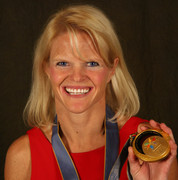As many of the Olympians are arriving home after their Olympic medal-winning performances it's reminded me of how I learned to deal with the pressure of making one of my first speeches. Still to this day, it was one of the most important presentations I've ever made, because it was made to my family, friends and hometown supporters. The preparation for this speech taught me a great deal about dealing with pressure and unknowingly primed me for an incredible career as a motivational speaker.
I had never been more nervous about making a speech than I was at my hometown parade after my Olympic win in 1998. My hometown honored me with my very own "Nikki Stone Day." My old high school was filled with family, friends and teachers, and a townful of supporters. It was the first time I was given the opportunity to publicly thank all those people who had supported me along the way. I didn't realize how much pressure I would feel or how emotional I'd become. At the first "thank you" I uttered, the tears began to flow and my mind went completely blank.
Knowing how much these acknowledgments meant to me, I didn't want to forget to thank anyone, so I had put in a full day of additional speech practice. Despite the pressure of the moment, I felt confident that I could get through the presentation because of all the preparation I'd put in. Without a pause, the names came pouring out of my mouth. Not one person was forgotten, and I walked away having learned the best secret for combating pressures: practice.
People often lack confidence when it's most important: in the heat of a critical moment, when the adrenaline is really pumping. It's much easier to demonstrate self-assurance when the pressure isn't on. Ask yourself if you have what it takes to perform when you're in a truly stressful situation. How many dry runs have you been through to ensure a resounding yes to that question? If something is important enough to be nervous about, then it's important enough to rehearse repeatedly. Before your next nerve-racking event, try rehearsing your performance three to five more times than you normally would. You will be amazed at your self-confidence when you walk into a situation fully prepared. And when your nerves kick in, it feels much better knowing you have rehearsed to a level where you're almost going on autopilot.
As you read my blogs, keep in mind that these stories, anecdotes and tools are all based around my philosophy for success: THE TURTLE EFFECT (Highlighted in the new book When Turtles Fly: Secrets of Successful People Who Know How to Stick Their Necks Out -- that was featured on the Today Show on February 7th). The Turtle Effect was taught to me by my mother when I was a young girl. She told me that I could achieve anything I wanted to as long as I remembered to have a soft inside, a hard shell, and be sure to stick my neck out.
Nikki Stone won Olympic gold after overcame a near career-ending spinal injury to win America’s first gold medal in the sport of Aerial Skiing. She was honored with the task of helping train the current Olympians on overcoming distractions, dealing with pressures, and harnessing confidence going into the Vancouver Olympics. And most recently, she was asked to be the motivational expert for a new Biggest Loser regional program.
Stone now works as a motivational speaker and recently authored the much-talked-about inspirational book When Turtles Fly: Secrets of Successful People Who Know How to Stick Their Necks Out (with contributors Lindsey Vonn, Shaun White, Tommy Hilfiger, and more). For more information, please visit www.WhenTurtlesFly.com and www.NikkiStone.com.





Add a CommentComments
There are no comments yet. Be the first one and get the conversation started!